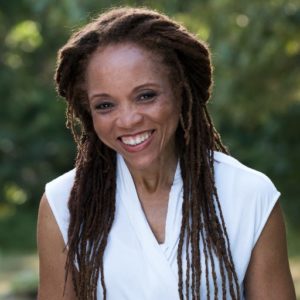As I edited a Q&A feature with Sophfronia Scott ahead of its appearance in the October 2017 issue of THE PRACTICING WRITER, I realized that Sophfronia’s responses were overflowing with important information. I requested her permission to transfer one particularly interesting piece of our e-mail exchange to this bonus/”teaser” material. She graciously agreed.

Erika Dreifus (ED): Having recently returned from a writing conference where the topic of the challenges of working on novels in conferences and MFA programs came up several times, I was intrigued to see, in the acknowledgments to your new novel UNFORGIVABLE LOVE, the following: “I wrote this book while an MFA student at the Vermont College of Fine Arts (VCFA) in Montpelier. I’m grateful to Ellen Lesser, the advisor who worked with me when I generated the first draft, and Bret Lott, who oversaw/edited the revisions leading to the manuscript I eventually submitted to [agent] Brettne [Bloom]. Mary Ruefle, Clint McCown, and Martha Southgate read excerpts in workshop and provided insightful feedback.” UNFORGIVABLE LOVE thus seems to me an example of a real success story for the idea of writing a novel—and, at about 500 pages, a fairly long one!—as an MFA student. Please us a bit about what worked so well—how might programs/instructors make novel-writing more positive/successful in these settings.
Sophfronia Scott (SS): It’s interesting that you wonder how programs/instructors could make novel-writing more positive/successful in these settings because I believe it all starts with the student. I think too many students enter programs with a 400-page manuscript in hand and think they’re just going to spend their time editing and revising this book they’ve already written. Often the student is so wedded to what’s already on the page that they’re reluctant to do anything differently and the instructor is at a loss because if the book is flawed structurally it’s hard to figure out how to begin to fix this huge thing. An MFA program is about learning—a student has to be open to figuring out what they need to learn and allowing the space for the instructor to help. With that in mind, I think it’s so much better to start a novel during a program.
I had one or two chapters of UNFORGIVABLE LOVE written when I started the program but I didn’t work on it right away. I spent a semester writing short stories because I wanted to focus on the various aspects of storytelling and stretch my creative muscles by coming up with different characters and learning my strengths and weaknesses in building narrative. In my second semester I was ready to work on the novel. I explained to Ellen Lesser what I was doing and how I really wasn’t sure of the best way to tell my story in novel form. We both understood I would be learning as I wrote, which is a great space to be in.
I just began writing and sending her the pages. Right away she noted my third-person voice was muddy and how I didn’t have a grasp on the difference between close third person and true omniscience. She had me read certain novels and I wrote craft papers about POV and this helped me to understand this craft piece and to make a clearer decision for my novel. Our process continued in this way, with her helping me study and work on key craft elements for the book (creating the atmosphere of the time, character development, dialogue) even as I built it. By the end of the semester I had a skeletal, but serviceable first draft.
Then I had to put it aside for a year! I was a dual-genre student and I spent the next two semesters studying creative nonfiction. I wrote and revised the novel a little (I did a lot of work on the North Carolina chapters during this time) but I mainly worked on writing essays. When I came back to the novel Bret Lott helped me assess where I was with the manuscript—what was missing (a lot!) and what needed revising. I just dove in and we went from there. Bret’s input was especially helpful in making sure I represented the physical space in the book, to make sure the reader could feel the movement through rooms and sense the characters as physical presences, not disembodied voices represented solely by the dialogue.
When it was time for workshop I was very specific about what I chose to submit. I went in with questions—problems I needed help on. The first time I chose an early chapter because I wanted to see how my characters came across when first encountered by the reader. The second time I chose a chapter that had a lot going on: flashback, description, interior dialogue. Was it too much? Did it work?
The excerpts I chose didn’t rely on knowing the whole story so that probably made it easier to read and comment on. I received helpful suggestions in both workshops and even, after the first one, spent several weeks on a new chapter that I ended up scrapping. Does that mean the chapter and workshop feedback failed? No, because I learned a lot in writing that chapter and that learning definitely helped my decision making as I continued to work on the book.
Bottom line? I allowed the novel to be part of my MFA learning process, not a previous creation that I expected someone to help me fix.
Look for the full Q&A with Sophfronia Scott in the newsletter issue that will go out at the beginning of October!